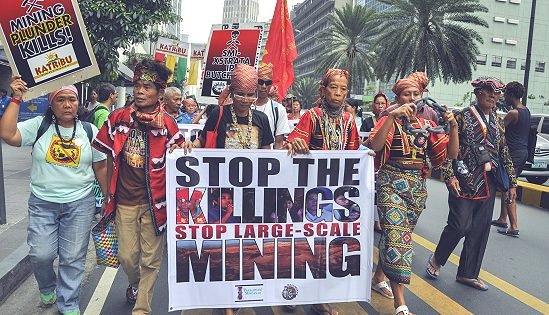Mindanao indigenous
peoples and environment groups to PNoy: scrap current mining policy to
avert another Pablo ‘apocalypse’!

Press Release
December 6, 2012
MANILA –
A group of Mindanao-based indigenous peoples and environment
organizations leading a ten-day lakbayan to Metro Manila called on
President Aquino to scrap the government’s standing mining policy
allowing large-scale mining operations in the light of the latest
disasters in Mindanao where super typhoon Pablo claimed more than two
hundred lives in the provinces of Compostela Valley and Davao Oriental
which have not experienced typhoons in recent years.
Environment group Panalipdan! Mindanao secretary-general Sr. Stella
Matutina, OSB said that hundreds of communities in Mindanao have been
rendered vulnerable to natural disasters due to the proliferation of
large-scale extractive industries being promoted by the Aquino
administration through existing government policies and programs such
as Executive Order 79 and the Mining Act of 1995.
“Do we need typhoon Pablo to get the attention of the central
government and concerned people about our issues like political
killings and environmental destructions caused by big extractive
industries and other agribusiness ventures?” Matutina said, adding
that “we are now right smack in Manila to air out our issues.”
“What we are seeing now is an environmental apocalypse not simply
caused by nature's wrath but by the Aquino’s continuing puppetry to
foreign mining interests and the government’s greed and corruption in
general. The heartbreaking disasters in the New Bataan and Cateel
towns and elsewhere illustrate how Mindanao's environment has reached
its maximum limit, and unless this government adopts a mining policy
which puts people’s safety over the insatiable thirst for profits of
large-scale mining companies, we can only expect greater destruction
in communities where there are big mining activities," Matutina also
said.
Prominent Mindanawon environmentalist Francis Morales also pointed out
the presence of the 2,139.44-hectare gold and copper mining project of
the Canadian-owned Philco Mining which operates in the hinterland
barangay of Camanlangan in New Bataan town. To date, typhoon Pablo has
left more than 70 people dead in this sleepy town which used to boast
of being typhoon-free.
Morales has long sounded the alarm about the unabated mining
explorations and operations in New Bataan, fearing that it will affect
the integrity of various ecosystems in the area such as Mt.
Kampalili-Tagub Range Complex, a known Key Biodiversity Area (KBA),
and Andap and Caragan watershed areas that supply ample amount of the
water for residential and agricultural uses in Compostela Valley
province.
He also said that despite these serious threats to the lives of the
local residents, the people have not been able to voice out their
opposition due to widespread military operations which, he said,
ostensibly protect big extractive industries.
“The ultimate objective of massive military deployments in New Bataan
is to wipe out all types of people’s resistance against mining under
the Investment Defense Force (IDF) and mining liberalization policy of
the Aquino regime. Despite the community’s resistance, militarization
has only resulted to displacement, intimidation and other string of
human rights abuses in New Bataan,” Morales said.
Meanwhile Higaonon leader Datu Jomorito Guaynon of Bukidnon chided
Noynoy for dodging the real issues and not “learning from the lessons
of the past.”
Guaynon, chairperson of the indigenous people group KALUMBAY, headed
an environmental mission after the Sendong tragedy almost a year ago,
which left 1,257 people dead and 13,337 houses damaged.
The mission yielded a conclusion that the primary reasons for the
massive devastation caused by Tropical Storm Sendong were the
extensive forest denudation and destruction of the Mt. Kitanglad and
Mt. Kalatungan watershed areas, and the encroachment of vast
agribusiness plantations and unabated mining and quarrying operations
in Bukidnon, located above the cities of Cagayan de Oro and Iligan.
Sr. Matutina, Morales and Guaynon are part of more than 70 indigenous
peoples’ leaders, environment advocates, and victims and relatives of
mining-related human rights violations, which compose the delegation
of Manilakbayan, a Mindanao peoples’ mobilization in Metro Manila. The
mobilization calls for the stop of large-scale mining and the killing
of large-scale mining oppositionists including indigenous peoples.
Thirty five persons in Mindanao, most of whom are leaders of
indigenous communities, have been killed due to their resistance to
large-scale mining operations.
The Manilakbayan will culminate on December 10 to mark the
commemoration of the International Human Rights Day.